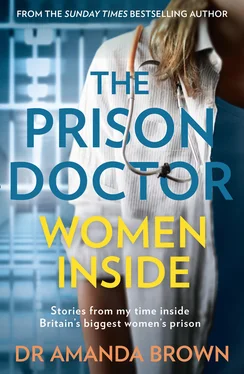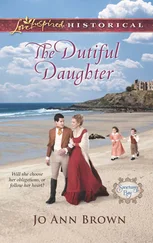Megan lay down and then pulled up her Nike jumper and released her breasts from the greying nursing bra.
‘The bra ain’t very sexy – one of the other mums on the MBU gave it to me, but at least there’s no one else to see it, thank goodness,’ she laughed.
‘Don’t I count?’ I smiled.
Her left breast was engorged, red, and felt hot to touch. Her nipple was also cracked and tender.
‘It’s agony when I feed him,’ she explained. I popped the thermometer in her ear and took her temperature, which was slightly raised. It was clear that she had mastitis, an infection that occurs in the tissue of the breast, most commonly during breast-feeding.
‘Are you still managing to breast-feed him?’ I asked her.
‘Yeah, all he wants to do all the time is feed, feed, feed. He’s a right greedy guts!’ she said. ‘It took a while to get the hang of it, and my god, my tits were a mess at the start – but we got there in the end.’
‘You look like you’ve been doing a brilliant job,’ I told her. ‘He is a really good size.’
She beamed at me with a wide smile, proud as punch. ‘Yeah, he’s put on 200 grams this week… I feel close to him when I feed him. Loads of the other girls don’t wanna do it, say it messes up your body and going on formula is easier. But I’m gonna try to stick with it, at least while I can.’
‘Good for you,’ I said. Breast-feeding is an excellent way for new mums to bond with their babies and feel close to them, which is perhaps even more important when in prison than at home, where they would most likely be surrounded by friends and family.
Another of nature’s powerful tools.
‘Keep feeding him as much as you can,’ I told her. ‘It might help to ease the pain a bit. Just make sure he is properly attached.’
‘He’s going to the nursery in two weeks though,’ Megan added. ‘They’ve told me I need to go back to work. I’m doing a course in catering, which I love, and I’m really hoping I can open my own little business selling sandwiches in offices when I get out of here.’
‘I hear wonderful things about the nursery,’ I told her. Within the MBU, which is set apart from the main accommodation units, is an OFSTED-registered nursery, Little Stars, which allows the mums to do their prison jobs and education with the rest of the residents, whilst their babies are looked after by nursery nurses, from around the time the babies are six to eight weeks old. ‘It’s a lovely place,’ I told her. ‘Bright and airy with a wonderful range of colourful toys and games. There are cots for the babies to nap in and the doors open to a courtyard area, with lots of outdoor toys, like ride-ons and a little toddler climbing frame.’
‘I know, the other girls rave about it. And I already feel like I know the staff there really well. They’re always helping us out. I dunno what I’m gonna do about feeding him then,’ she added. ‘Guess he’ll have to go on the bottle. I’m feeling so exhausted though. I don’t know how I’m ever gonna get back to work.’
‘You’ll be fine,’ I told her. ‘I’m sure you will manage. You strike me as being very strong and determined.’
I thought back to when I first met Megan when she first arrived at Bronzefield. I was working in Reception that evening. She had been in a very controlling relationship for about three years. She had never been in prison before and was so scared and shocked, as she said that she had not expected to be given a custodial sentence. She didn’t even know she was pregnant when she came in, but as part of the new Reception screening process, most of the new residents have a pregnancy test when they arrive, as well as having their urine screened for drugs and alcohol.
I remember how surprised and initially distraught she was when she found out that she was expecting.
She had been charged with conspiracy to supply class A drugs, along with her older and dominant ex-boyfriend. She said that she was aware that he had been involved with dealing drugs in the past, but he had told her he was no longer doing it. She said she was totally unaware that he had drugs hidden in the flat that they shared, until the police raided their property.
‘I later found out there were drugs hidden in his sock drawer, and in all his designer trainers in our bedroom – he had loads, rows of ’em,’ she told me. ‘The first I knew about it was when I was woken up at about six in the morning, with a team of police leaning over me, telling me I was under arrest. I nearly shit myself I was that scared.’
The judge said that it was impossible that she hadn’t known that the drugs were there. Megan had sobbed throughout the Reception process, and she was still crying when my Reception shift was over.
I continued to see her from time to time over the next few months, and as her pregnancy advanced, her excitement and hope grew at the rate of her expanding belly, which was wonderful to see. She had been in touch with Birth Companions, a community-based organisation that holds weekly meetings with perinatal women within the prison, who had helped her prepare for motherhood. She was intent on being there for her baby, and being a good mum.
‘I feel like one of the lucky ones, being able to have Dylan with me,’ Megan said. ‘I made an application, and different groups of people decided it was the right decision for me and for him.’
‘He knows we’re talking about him,’ I joked, as Dylan made gentle gurgling and snuffling noises.
We both peered back into the buggy, as he stretched his arms out from where they had been tucked closely into his chest.
‘I want to start afresh. I mean, I’m only 22, and my family have stuck by me and will help me – help both of us – when we get out of here.’
‘That’s great that your family are so supportive,’ I said.
She looked thoughtful.
‘It must be so hard for the girls who don’t get to look after their babies. There was one girl on the block where I lived, whose baby girl was fostered out because her family wouldn’t take her. Her sentence was really long – a few years, I think. She was worried that her daughter might end up being adopted, and she would lose her forever. She was so desperate. It must be heartbreaking.’
When the women are in prison for a long time and there is no family available to help out, babies might go into foster care temporarily until the mother is released, or be adopted with the mother’s consent, a process called voluntary adoption.
In some cases, when the sentence is long, the baby will initially be looked after by the mother in the MBU, and then will start to spend increasing amounts of time away from the unit with family members or a foster family, to cause minimal trauma to mother and child. Babies are also taken out of the prison environment regularly, to the local parks and a nearby toddler group, so they can get used to the unfamiliar sights, sounds and smells, and to acclimatise them to life on the outside.
In cases where the baby is taken away from the mother and adopted without their permission – involuntary adoption – the sorrow can understandably be deep and profound and can make it even harder for the women to tackle their addictions and other issues. A powerful stigma exists for women who have been deemed by the courts to be unfit to look after their child or children. It is very hard for everyone involved, but ultimately, the decision always has to be made in the child’s best interests. There are many, many people involved in the care of both the mother and the baby. Mothering simply adds a whole new layer of complexity to the female prison experience and there is rarely a perfect solution.
‘I see many women in the MBU that have the chance to start afresh,’ I told Megan. ‘You are doing a great job.’
Читать дальше












